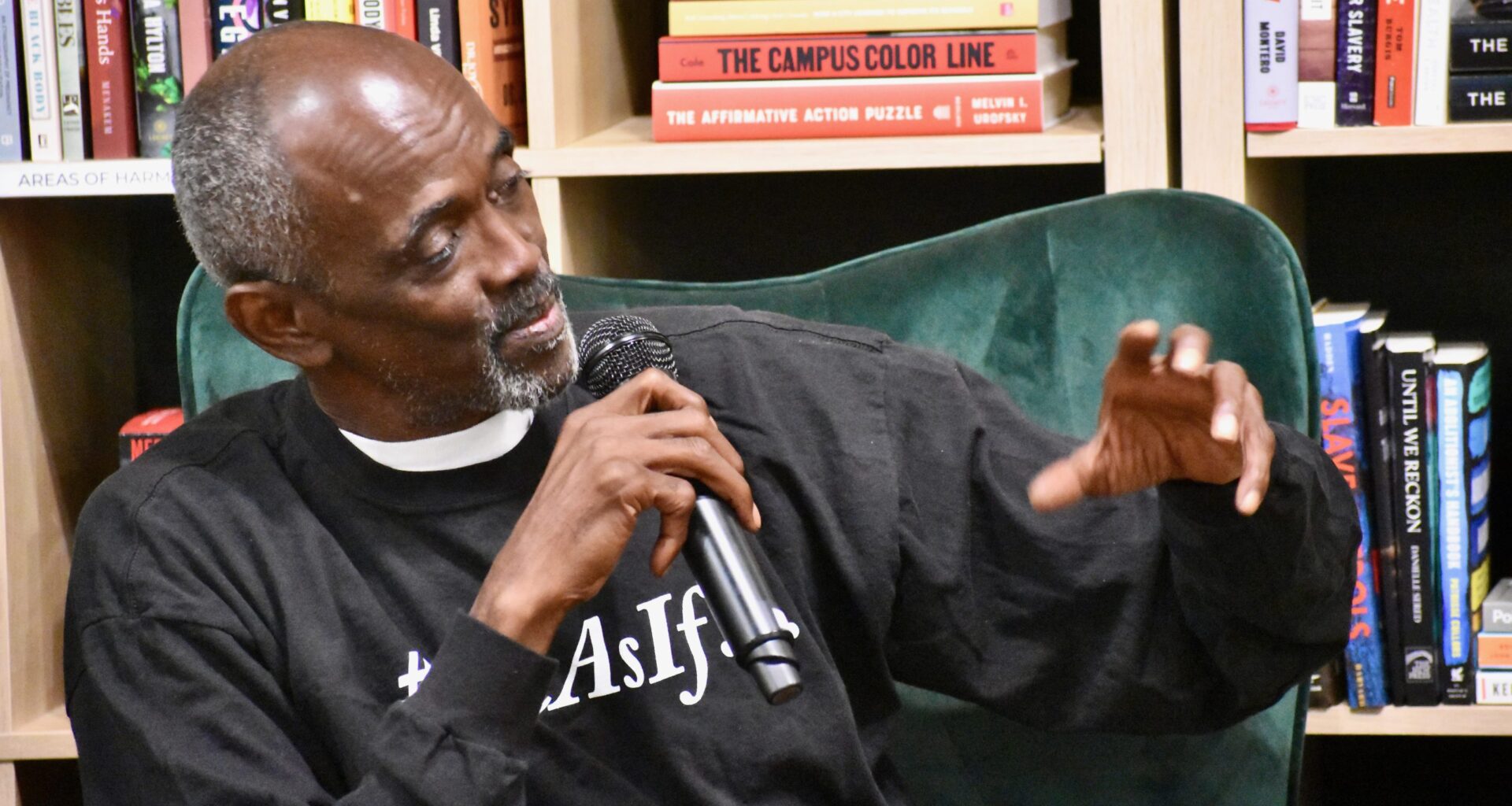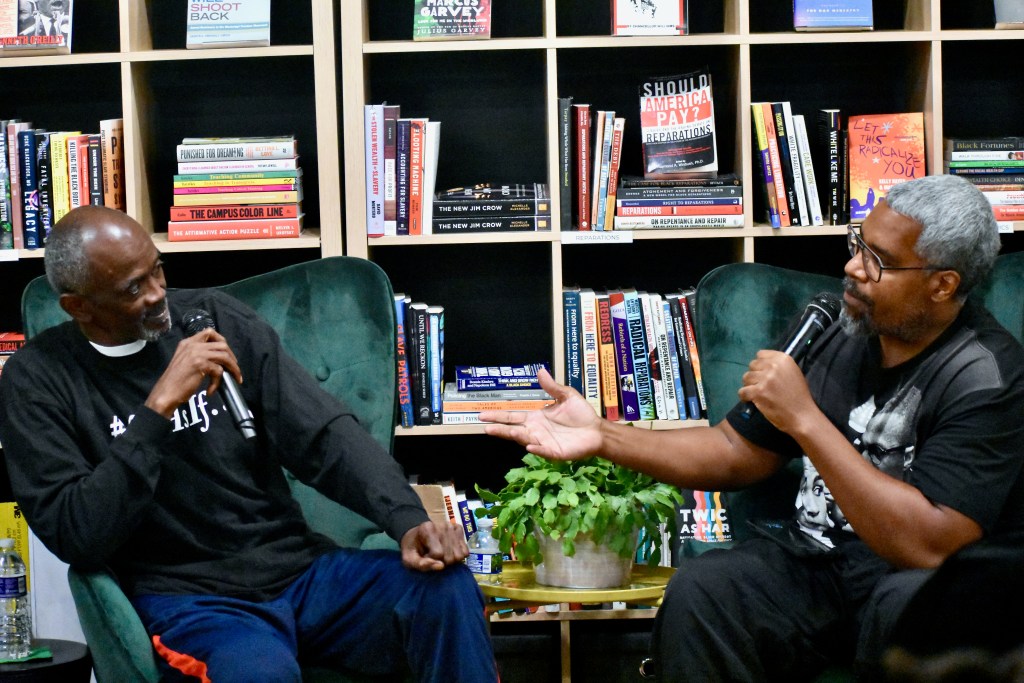 Moderator Yohance Lacour interviews two-time NBA champion Craig Hodges at FirstRepair. Credit: Heidi Randhava
Moderator Yohance Lacour interviews two-time NBA champion Craig Hodges at FirstRepair. Credit: Heidi Randhava
The Evanston-based nonprofit FirstRepair hosted an “End of August Fireside Chat” featuring former Chicago Bulls player Craig Hodges Thursday at its 1900 Asbury resource center.
The two-time NBA champ shared personal insights about his 10 seasons in the NBA while discussing his book Long Shot: The Triumphs and Struggles of an NBA Freedom Fighter. During the chat, Hodges detailed why he believes his activism, both as an NBA player and the players’ union president, resulted in an organized effort to keep him out of the league.
Moderating the event was Yohance Lacour, a Chicago-based cultural leader and entrepreneur. During their conversation, he explored Hodges’ life as a professional athlete and social and political activist. The audience leaned in when the discussion turned to what would become a defining moment in Hodges’ career.
On Oct. 1, 1991, Hodges joined his teammates for a visit to the White House to celebrate the Bulls’ first NBA title with President George H.W. Bush. He brought a letter he wrote to Bush, asking the president to more actively address issues such as violence and lack of jobs that disproportionately impact Black communities.
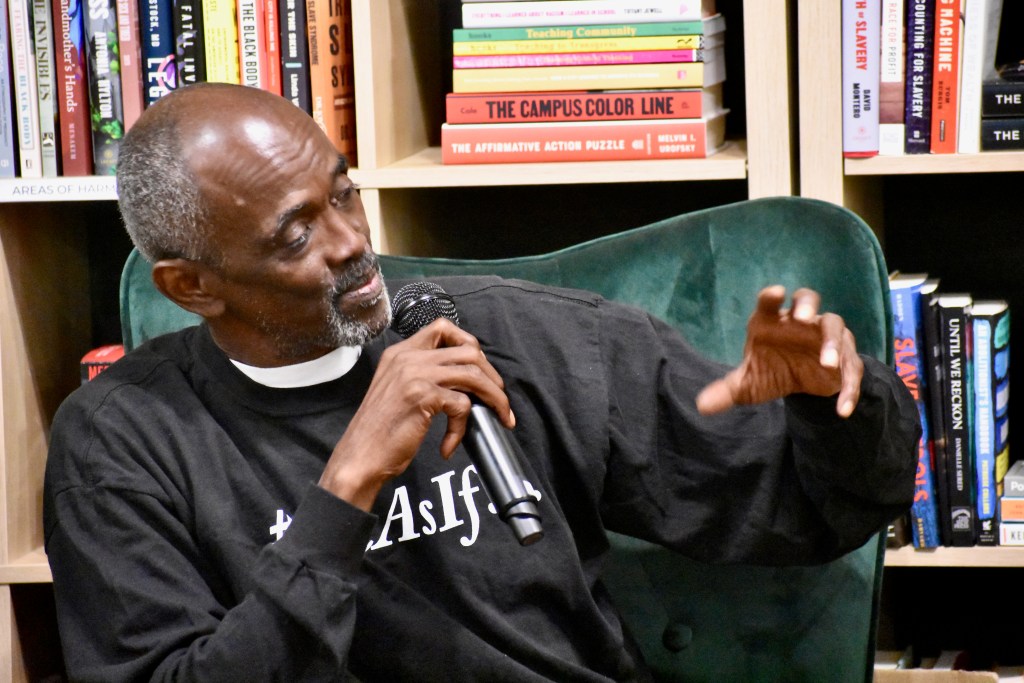 Former NBA player Craig Hodges discusses his commitment to using his platform to address inequality. Credit: Heidi Randhava
Former NBA player Craig Hodges discusses his commitment to using his platform to address inequality. Credit: Heidi Randhava
“I was a young man eager to continue to use the platform I’d earned as a professional athlete to draw attention to those who couldn’t play in the NBA. I’d soon learn, however, that … my freedom of expression had serious limits — limits that would cost me my livelihood,” Hodges wrote in the prologue of his book.
Less than a year after he visited the White House as a champion, Hodges made his final shot as an NBA player on June 10, 1992, in Game 4 of the NBA Finals against the Portland Trail Blazers. The Bulls went on to win their second straight NBA title.
A month later, Hodges was released by the Bulls. As a 32-year-old free agent, he did not get offers from any NBA team. He was also known for his 3-point prowess, winning the NBA 3-point contest three consecutive times (1990-1992).
Hodges said he was aware that his letter to the president added to concerns within the league about his activism. He had tried, unsuccessfully, to organize players to sit out Game 1 of the Bulls-Los Angeles Lakers NBA Finals in 1991 in response to the beating of Rodney King by four Los Angeles Police Department officers.
Hodges said he was inspired by his mother to speak out and do what he could to advocate for social justice and civil rights.
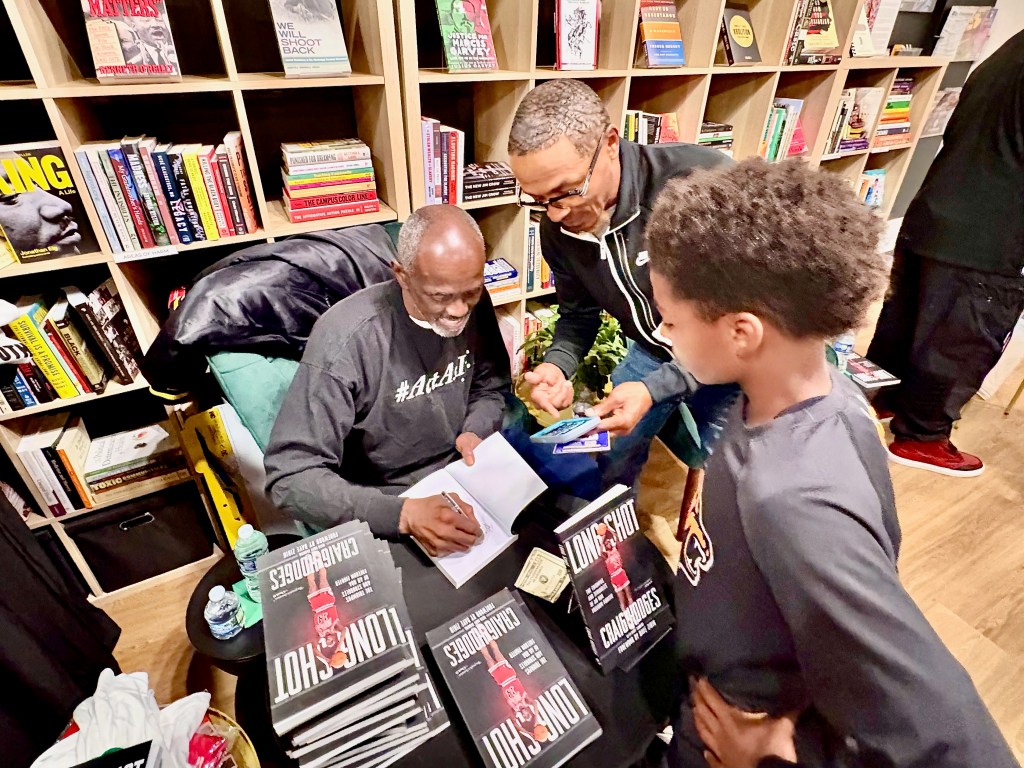 Craig Hodges signs copies of his book. Credit: Heidi Randhava
Craig Hodges signs copies of his book. Credit: Heidi Randhava
The price of speaking out
Hodges said he believes his activism, both as an NBA player and a players union president, resulted in an organized effort to keep him out of the league. His letter to the president came at a time when few athletes used their platforms to speak out publicly on social issues.
“A whole lot of players knew more should be done for the communities most of us came from, yet the fear of losing our spot always knocked out the urgent need to fight racism and structural poverty. But not for me,” writes Hodges in his book.
Knowing the risks of his “political outspokenness,” Hodges said he was still more disappointed than he could have imagined when he lost his spot with the Bulls — the team he grew up watching and cheering for.
“[Bulls General Manager] Jerry Krause called to break the news … The call knocked the wind out of me. As much as I’d told myself this might happen, nothing could have prepared me for it,” he wrote.
Hodges said he also was encouraged by his grandmother, aunts and uncles to maintain his sense of purpose. “You made the choice to line your career up with your values,” his grandmother told him.
“There was nobody on that bus that went to the White House, that knew about my letter, that read my letter, who said, ‘Hodge, that’s wrong.’… It wasn’t wrong,” Hodges told Lacour in the interview.
Giving back to the community
The final portion of the Fireside Chat was dedicated to audience questions and comments. Some audience members said they have been friends with Hodges for decades. Others, including photographer Don Barge, who grew up in Evanston, are Black business owners who said Hodges helped them get contracts.
“This man walks his talk,” Barge said.
Attendee Crawford Richmond and Hodges have known each other since high school, when basketball brought them together as competitors on opposing teams in the Centralia Holiday Tournament in 1976. Richmond played for Evanston Township High School and Hodges played for south suburban Rich East High School in Park Forest.
“We’ve been lifelong friends ever since,” Richmond said. They went on to become teammates in college at Long Beach State in California under coach Tex Winter. Winter would coach Hodges again when he became a critical piece of Bulls head coach Phil Jackson’s staff.
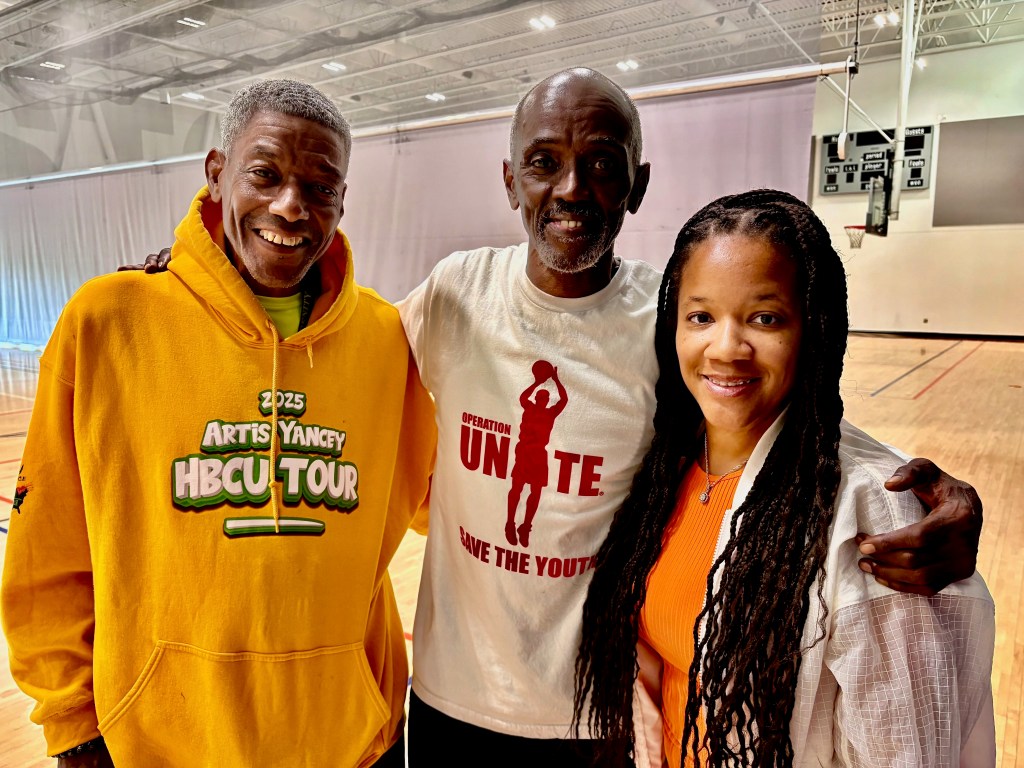 Craig Hodges, center, embraces lifelong friends Crawford Richmond, left, and Robin Rue Simmons at Robert Crown. Credit: Heidi Randhava
Craig Hodges, center, embraces lifelong friends Crawford Richmond, left, and Robin Rue Simmons at Robert Crown. Credit: Heidi Randhava
On the courts with the kids at Robert Crown
While in Evanston, Hodges joined Richmond on the basketball courts at Robert Crown Center, where he gave tips and worked out with middle school youth.
Although he has visited Evanston before, Hodges said this time was special.
“For me to be invited to come and speak is a privilege as well as big fun because Crawford, as well as Robin, are like family to me,” said Hodges, referring to FirstRepair founder and Executive Director Robin Rue Simmons, who is Crawford Richmond’s niece.
“It’s good memories, as well as teaching this young generation a little bit about the game and the sport,” Hodges said in an interview with the RoundTable.
His advice for coaches and young athletes is “to slow it down and get [kids] to understand that there’s a lot of work involved. And if you want to be a part of it, you have to be passionate about it and committed to the work.”
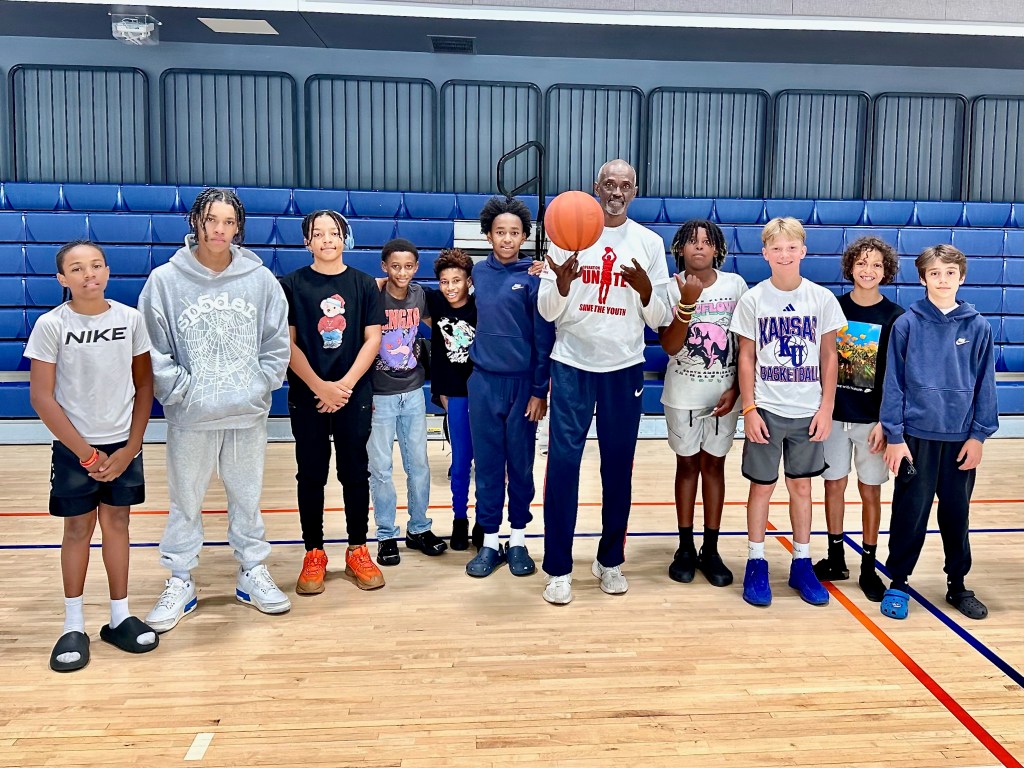 NBA three-point shooting legend Craig Hodges works out with middle school youth at Robert Crown. Credit: Submitted by FirstRepair.
NBA three-point shooting legend Craig Hodges works out with middle school youth at Robert Crown. Credit: Submitted by FirstRepair.
After playing for the LA Clippers, Milwaukee Bucks, Phoenix Suns and the Bulls, Hodges went on to a coaching career that included head coach at Chicago State University, special assistant coach under Phil Jackson for the Los Angeles Lakers and assistant and interim coach for the G League’s Westchester Knicks.
His most recent coaching stint was at the now closed Rich East High School in his hometown of Park Forest.
Related Stories
